Use Cases
- Use cases
- Notebooks
- All Notebooks
- Websockets: Streaming input and output using websockets
- Perplexity Search Tool
- Auto Generated Agent Chat: Task Solving with Code Generation, Execution, Debugging & Human Feedback
- Using a local Telemetry server to monitor a GraphRAG agent
- Auto Generated Agent Chat: Task Solving with Provided Tools as Functions
- RealtimeAgent with gemini client
- Agentic RAG workflow on tabular data from a PDF file
- Language Agent Tree Search
- Config loader utility functions
- Wikipedia Agent
- Google Drive Tools
- FSM - User can input speaker transition constraints
- DeepResearchAgent
- Group Chat with Retrieval Augmented Generation
- AgentOptimizer: An Agentic Way to Train Your LLM Agent
- Using RetrieveChat with Qdrant for Retrieve Augmented Code Generation and Question Answering
- RealtimeAgent with WebRTC connection
- Agent with memory using Mem0
- Preprocessing Chat History with `TransformMessages`
- RealtimeAgent in a Swarm Orchestration
- RAG OpenAI Assistants in AG2
- Using Guidance with AG2
- Using RetrieveChat Powered by MongoDB Atlas for Retrieve Augmented Code Generation and Question Answering
- Using Neo4j's graph database with AG2 agents for Question & Answering
- Use AG2 in Databricks with DBRX
- Wikipedia Search Tools
- Solving Complex Tasks with Nested Chats
- DeepSeek: Adding Browsing Capabilities to AG2
- Solving Complex Tasks with A Sequence of Nested Chats
- Nested Chats for Tool Use in Conversational Chess
- OpenAI Assistants in AG2
- Group Chat with Coder and Visualization Critic
- Agent Chat with Multimodal Models: LLaVA
- SocietyOfMindAgent
- Conversational Workflows with MCP: A Marie Antoinette Take on The Eiffel Tower
- Agent Chat with Multimodal Models: DALLE and GPT-4V
- StateFlow: Build Workflows through State-Oriented Actions
- Small, Local Model (IBM Granite) Multi-Agent RAG
- Group Chat with Tools
- DuckDuckGo Search Tool
- Load the configuration including the response format
- RealtimeAgent in a Swarm Orchestration
- MCP Clients
- Agent Tracking with AgentOps
- SQL Agent for Spider text-to-SQL benchmark
- AutoBuild
- Automatically Build Multi-agent System from Agent Library
- Generate Dalle Images With Conversable Agents
- Agent Observability with OpenLIT
- Using RetrieveChat Powered by Couchbase Capella for Retrieve Augmented Code Generation and Question Answering
- A Uniform interface to call different LLMs
- OptiGuide with Nested Chats in AG2
- Conversational Chess using non-OpenAI clients
- Chat Context Dependency Injection
- Agent with memory using Mem0
- `run` function examples with event processing
- From Dad Jokes To Sad Jokes: Function Calling with GPTAssistantAgent
- Mitigating Prompt hacking with JSON Mode in Autogen
- Group Chat with Customized Speaker Selection Method
- Trip planning with a FalkorDB GraphRAG agent using a Swarm
- Tavily Search Tool
- Structured output
- Adding Google Search Capability to AG2
- Task Solving with Provided Tools as Functions (Asynchronous Function Calls)
- Conversational Workflows with MCP: A French joke on a random Wikipedia article
- Auto Generated Agent Chat: Using MathChat to Solve Math Problems
- Agent Chat with custom model loading
- Auto Generated Agent Chat: Function Inception
- Use AG2 to Tune ChatGPT
- Auto Generated Agent Chat: Group Chat with GPTAssistantAgent
- Using FalkorGraphRagCapability with agents for GraphRAG Question & Answering
- Solving Multiple Tasks in a Sequence of Async Chats
- Discord, Slack, and Telegram messaging tools
- RealtimeAgent in a Swarm Orchestration using WebRTC
- Runtime Logging with AG2
- WebSurferAgent
- Use MongoDBQueryEngine to query Markdown files
- Conversational Workflows with MCP: A Shakespearean Take on arXiv Abstracts
- RAG with DocAgent
- Solving Multiple Tasks in a Sequence of Chats
- Cross-Framework LLM Tool for CaptainAgent
- Web Scraping using Apify Tools
- Auto Generated Agent Chat: Collaborative Task Solving with Coding and Planning Agent
- Currency Calculator: Task Solving with Provided Tools as Functions
- Use ChromaDBQueryEngine to query Markdown files
- Using RetrieveChat for Retrieve Augmented Code Generation and Question Answering
- Writing a software application using function calls
- Using OpenAI’s Web Search Tool with AG2
- Using RetrieveChat Powered by PGVector for Retrieve Augmented Code Generation and Question Answering
- Enhanced Swarm Orchestration with AG2
- Perform Research with Multi-Agent Group Chat
- Auto Generated Agent Chat: Teaching AI New Skills via Natural Language Interaction
- Usage tracking with AG2
- Using Neo4j's native GraphRAG SDK with AG2 agents for Question & Answering
- Groupchat with Llamaindex agents
- Assistants with Azure Cognitive Search and Azure Identity
- Swarm Orchestration with AG2
- Tools with Dependency Injection
- Structured output from json configuration
- Solving Multiple Tasks in a Sequence of Chats with Different Conversable Agent Pairs
- Chat with OpenAI Assistant using function call in AG2: OSS Insights for Advanced GitHub Data Analysis
- Auto Generated Agent Chat: Collaborative Task Solving with Multiple Agents and Human Users
- Adding YouTube Search Capability to AG2
- Chatting with a teachable agent
- Making OpenAI Assistants Teachable
- RealtimeAgent in a Swarm Orchestration
- Translating Video audio using Whisper and GPT-3.5-turbo
- Run a standalone AssistantAgent
- Auto Generated Agent Chat: Task Solving with Langchain Provided Tools as Functions
- Use LLamaIndexQueryEngine to query Markdown files
- Auto Generated Agent Chat: GPTAssistant with Code Interpreter
- Interactive LLM Agent Dealing with Data Stream
- Agent Chat with Async Human Inputs
- ReasoningAgent - Advanced LLM Reasoning with Multiple Search Strategies
- Auto Generated Agent Chat: Solving Tasks Requiring Web Info
- Use AG2 to Tune OpenAI Models
- Engaging with Multimodal Models: GPT-4V in AG2
- Supercharging Web Crawling with Crawl4AI
- Use AG2 in Microsoft Fabric
- Cross-Framework LLM Tool Integration with AG2
- Demonstrating the `AgentEval` framework using the task of solving math problems as an example
- Group Chat
- Adding Browsing Capabilities to AG2
- CaptainAgent
- (Legacy) Implement Swarm-style orchestration with GroupChat
- Task Solving with Code Generation, Execution and Debugging
- RealtimeAgent with local websocket connection
- Community Gallery
On this page
Notebooks
Enhanced Swarm Orchestration with AG2
Swarm Ochestration
 AG2’s swarm orchestration provides a flexible and powerful method of
managing a conversation with multiple agents, tools, and transitions.
In this notebook, we look at more advanced features of the swarm
orchestration.
If you are new to swarm, check out this
notebook,
where we introduce the core features of swarms including global context
variables, hand offs, and initiating a swarm chat.
In this notebook we’re going to demonstrate these features AG2’s swarm
orchestration:
AG2’s swarm orchestration provides a flexible and powerful method of
managing a conversation with multiple agents, tools, and transitions.
In this notebook, we look at more advanced features of the swarm
orchestration.
If you are new to swarm, check out this
notebook,
where we introduce the core features of swarms including global context
variables, hand offs, and initiating a swarm chat.
In this notebook we’re going to demonstrate these features AG2’s swarm
orchestration:
- Updating an agent’s state
- Conditional handoffs
- Nested chats
Install
ag2:Copy
pip install -U ag2[openai]
Note: If you have been usingFor more information, please refer to the installation guide.autogenorag2, all you need to do is upgrade it using:orCopypip install -U autogenasCopypip install -U ag2autogen, andag2are aliases for the same PyPI package.
Demonstration
We’re creating this customer service workflow for an e-commerce platform. Customers can ask about the status of their orders, but they must be authenticated to do so.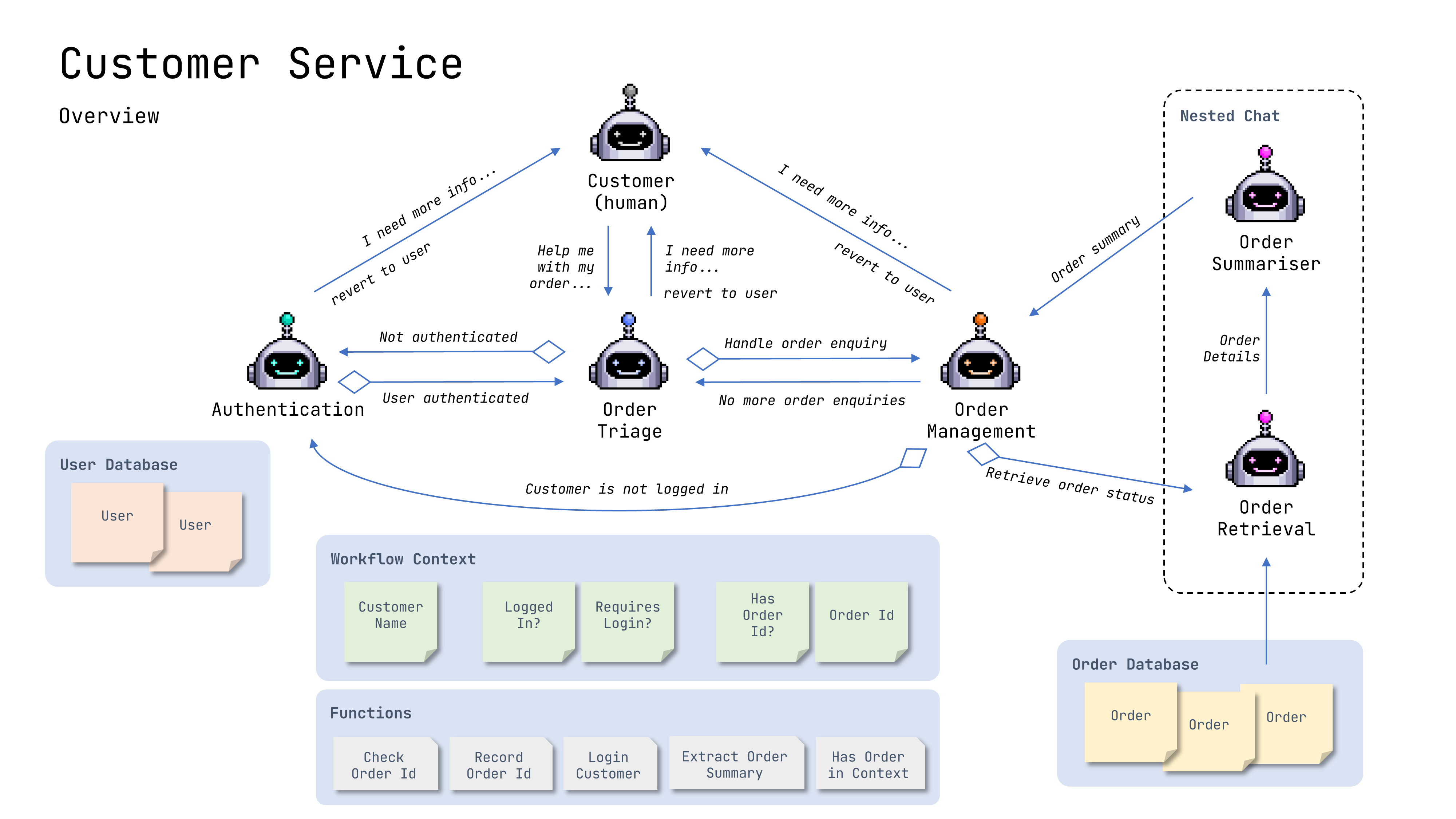 Key aspects of this swarm are:
Key aspects of this swarm are:
- System messages are customised, incorporating the context of the workflow
- Handoffs are conditional, only being available when they are relevant
- A nested chat handles the order retrieval and summarisation
Copy
# IMPORTS
import json
from typing import Any
# AG2 imports
from autogen import (
AfterWork,
AfterWorkOption,
ContextExpression,
ConversableAgent,
LLMConfig,
OnCondition,
OnContextCondition,
SwarmResult,
UpdateSystemMessage,
UserProxyAgent,
initiate_swarm_chat,
register_hand_off,
)
Set your API Endpoint
TheLLMConfig.from_json
method loads a list of configurations from an environment variable or a
json file.
Copy
# Load configuration from an OAI_CONFIG_LIST file
# and filter it to OpenAI's GPT-4o
# Create an LLM configuration with our config
llm_config = LLMConfig.from_json(
path="OAI_CONFIG_LIST",
cache_seed=42,
temperature=1,
timeout=120, # change the cache_seed for different trials
).where(tags=["gpt-4o"])
Context
Copy
# Context used for controlling the workflow and injecting information
# into some agent's system messages
workflow_context = {
# customer details
"customer_name": None, # Injected into Triage & Order Management Agent's system messages
"logged_in_username": None, # Helps validate order
# workflow status
"logged_in": False, # Control the flow
# order enquiry details
"has_order_id": False, # Control the flow
"order_id": None, # Order validation and included in system messages
}
Databases
Copy
# Mock Databases
# User Database with the username as the key
USER_DATABASE = {
"mark": {
"full_name": "Mark Sze",
},
"kevin": {
"full_name": "Yiran Wu",
},
}
# Order Database with the order number as the key
# The user field aligns with the username in USER_DATABASE
ORDER_DATABASE = {
"TR13845": {
"user": "mark",
"order_number": "TR13845",
# order status: order_received, shipped, delivered, return_started, returned
"status": "shipped",
# return status: N/A, return_started, return_shipped, return_delivered, refund_issued
"return_status": "N/A",
"product": "matress",
"link": "https://www.example.com/TR13845",
"shipping_address": "123 Main St, State College, PA 12345",
},
"TR14234": {
"user": "kevin",
"order_number": "TR14234",
"status": "delivered",
"return_status": "N/A",
"product": "pillow",
"link": "https://www.example.com/TR14234",
"shipping_address": "123 Main St, State College, PA 12345",
},
"TR29384": {
"user": "mark",
"order_number": "TR29384",
"status": "delivered",
"return_status": "N/A",
"product": "bed frame",
"link": "https://www.example.com/TR29384",
"shipping_address": "123 Main St, State College, PA 12345",
},
}
Agent’s Functions
Copy
# ORDER FUNCTIONS
def check_order_id(order_id: str, context_variables: dict) -> SwarmResult:
"""Check if the order ID is valid"""
order_id = order_id.upper().strip()
# Restricts order to checking to the logged in user
if (
context_variables["logged_in_username"]
and order_id in ORDER_DATABASE
and ORDER_DATABASE[order_id]["user"] == context_variables["logged_in_username"]
):
return SwarmResult(
context_variables=context_variables, values=f"Order ID {order_id} is valid.", agent=order_triage_agent
)
else:
# Order ID wasn't found or doesn't belong to the logged in user
return SwarmResult(
context_variables=context_variables,
values=f"Order ID {order_id} is invalid. Please ask for the correct order ID.",
agent=order_triage_agent,
)
def record_order_id(order_id: str, context_variables: dict) -> SwarmResult:
"""Record the order ID in the workflow context"""
order_id = order_id.upper().strip()
if order_id not in ORDER_DATABASE:
# Order ID wasn't found or doesn't belong to the logged in user
# Transfer back to the order triage agent
return SwarmResult(
context_variables=context_variables,
values=f"Order ID {order_id} not found. Please ask for the correct order ID.",
agent=order_triage_agent,
)
context_variables["order_id"] = order_id
context_variables["has_order_id"] = True
# Order ID has been recorded, transfer to the order management agent
return SwarmResult(
context_variables=context_variables, values=f"Order ID Recorded: {order_id}", agent=order_mgmt_agent
)
# AUTHENTICATION FUNCTIONS
def login_customer_by_username(username: str, context_variables: dict) -> SwarmResult:
"""Get and log the customer in by their username"""
username = username.lower().strip()
if username in USER_DATABASE:
context_variables["customer_name"] = USER_DATABASE[username]["full_name"]
context_variables["logged_in_username"] = username
context_variables["logged_in"] = True
# Successful login, transfer to the order triage agent
return SwarmResult(
context_variables=context_variables,
values=f"Welcome back our customer, {context_variables['customer_name']}! Please continue helping them.",
# Note: We aren't specifying an agent here as the OnContextCondition handoff the Authentication Agent will handle it
)
else:
# User not found, transfer back to the authentication agent
return SwarmResult(
context_variables=context_variables,
values=f"User {username} not found. Please ask for the correct username.",
agent=authentication_agent,
)
Agents
Copy
# AGENTS
# Human customer
# Represents us as human-in-the-loop
user = UserProxyAgent(
name="customer",
code_execution_config=False,
)
# Triage Agent
# Triage Agent prompt includes placeholders for the customer name, logged in status, and order ID
order_triage_prompt = """You are an order triage agent, working with a customer and a group of agents to provide support for your e-commerce platform.
An agent needs to be logged in to be able to access their order. The authentication_agent will work with the customer to verify their identity, transfer to them to start with.
The order_mgmt_agent will manage all order related tasks, such as tracking orders, managing orders, etc. Be sure to check the order as one step. Then if it's valid you can record it in the context.
Use the check_order_id tool before the record_order_id tool, never together.
Ask the customer for further information when necessary.
The current status of this workflow is:
Customer name: {customer_name}
Logged in: {logged_in}
Enquiring for Order ID: {order_id}
"""
order_triage_agent = ConversableAgent(
name="order_triage_agent",
update_agent_state_before_reply=[
UpdateSystemMessage(order_triage_prompt), # Inject the context variables into the system message
],
functions=[check_order_id, record_order_id], # Functions available to the agent
llm_config=llm_config,
)
# Authentication Agent
authentication_prompt = "You are an authentication agent that verifies the identity of the customer."
authentication_agent = ConversableAgent(
name="authentication_agent",
system_message=authentication_prompt,
functions=[login_customer_by_username], # Functions available to the agent
llm_config=llm_config,
)
# Order Management Agent
# Order Management Agent prompt includes placeholders for the customer name, logged in status, and order ID
order_management_prompt = """You are an order management agent that manages inquiries related to e-commerce orders.
The order must be logged in to access their order.
Use your available tools to get the status of the details from the customer. Ask the customer questions as needed.
Use the check_order_id tool before the record_order_id tool, never together.
The current status of this workflow is:
Customer name: {customer_name}
Logged in: {logged_in}
Enquiring for Order ID: {order_id}
"""
order_mgmt_agent = ConversableAgent(
name="order_mgmt_agent",
update_agent_state_before_reply=[
UpdateSystemMessage(order_management_prompt), # Inject the context variables into the system message
],
functions=[check_order_id, record_order_id], # Functions available to the agent
llm_config=llm_config,
)
Nested Chats
Copy
# NESTED CHAT - Delivery Status using a two-step chat queue:
# The first step retrieves the order details with the order_retrieval_agent
# The second step summarises the order details with the order_summariser_agent
order_retrieval_agent = ConversableAgent(
name="order_retrieval_agent",
system_message="You are an order retrieval agent that gets details about an order.",
llm_config=llm_config,
)
order_summariser_agent = ConversableAgent(
name="order_summariser_agent",
system_message="You are an order summariser agent that provides a summary of the order details.",
llm_config=llm_config,
)
# Function to generate the message for the order_retireval_agent to use to output the order details
def extract_order_summary(recipient: ConversableAgent, messages, sender: ConversableAgent, config):
"""Extracts the order summary based on the OrderID in the context variables"""
order_id = sender.get_context("order_id")
if order_id in ORDER_DATABASE:
order = ORDER_DATABASE[order_id]
return f"Order:\n{json.dumps(order, indent=4)}"
else:
return f"Order {order_id} not found."
nested_chat_one = {
"carryover_config": {"summary_method": "last_msg"}, # Bring the last message into the chat
"recipient": order_retrieval_agent,
"message": extract_order_summary, # Retrieve the status details of the order using the order id
"max_turns": 1, # Only one turn is necessary
}
nested_chat_two = {
"recipient": order_summariser_agent,
"message": "Summarise the order details provided in a Markdown table format with headings: Detail, Information",
"max_turns": 1,
"summary_method": "last_msg", # Return their message back as the nested chat output
}
# Construct the chat queue
chat_queue = [nested_chat_one, nested_chat_two]
Handoffs (OnCondition, OnContextCondition, and AfterWork)
Copy
# HANDOFFS
# Triage Agent handoffs
register_hand_off(
agent=order_triage_agent,
hand_to=[
# If the customer is not logged in, transfer to the authentication agent
OnCondition(
target=authentication_agent,
condition="The customer is not logged in, authenticate the customer.",
available=ContextExpression("!(${logged_in})"),
),
# If the customer is logged in, transfer to the order management agent
OnCondition(
target=order_mgmt_agent,
condition="The customer is logged in, continue with the order triage.",
available="logged_in",
),
# If the order enquiry has been fulfilled, transfer back to the user
AfterWork(AfterWorkOption.REVERT_TO_USER),
],
)
# Authentication Agent handoffs
register_hand_off(
agent=authentication_agent,
hand_to=[
# When logged in, transfer to the order triage agent (no LLM required)
# OnContextCondition checks the context variables and handsoff immediately
OnContextCondition(
target=order_triage_agent,
condition="logged_in",
),
# If the customer cannot be authenticated, tell the user so it can try again
AfterWork(AfterWorkOption.REVERT_TO_USER),
],
)
# Function to check if we have an Order ID, used in the Order Management Agent handoff
def has_order_in_context(agent: ConversableAgent, messages: list[dict[str, Any]]) -> bool:
return agent.get_context("has_order_id")
# Order Management Agent handoffs
register_hand_off(
agent=order_mgmt_agent,
hand_to=[
# If we have an Order ID, transfer to the nested chat to get the order summary
OnCondition(
target={
"chat_queue": chat_queue,
},
condition="Retrieve the status of the order",
available=has_order_in_context,
),
# If the user is not logged in, transfer to the authentication agent
OnCondition(
target=authentication_agent,
condition="The customer is not logged in, authenticate the customer.",
available=ContextExpression("!(${logged_in})"),
),
# If the customer has no more enquiries about this order, transfer back to the
# Triage agent to handle it enquiry
OnCondition(target=order_triage_agent, condition="The customer has no more enquiries about this order."),
# As a fallback, transfer back to the user for more information
AfterWork(AfterWorkOption.REVERT_TO_USER),
],
)
Let’s go!
Copy
# Start the chat with the Triage Agent
chat_history = initiate_swarm_chat(
initial_agent=order_triage_agent,
agents=[order_triage_agent, authentication_agent, order_mgmt_agent],
context_variables=workflow_context, # Our shared context
messages="Can you help me with my order.", # Starting message
user_agent=user, # Human-in-the-loop
max_rounds=40, # Maximum number of turns
after_work=AfterWorkOption.TERMINATE,
)
Controlling flow
When not logged in
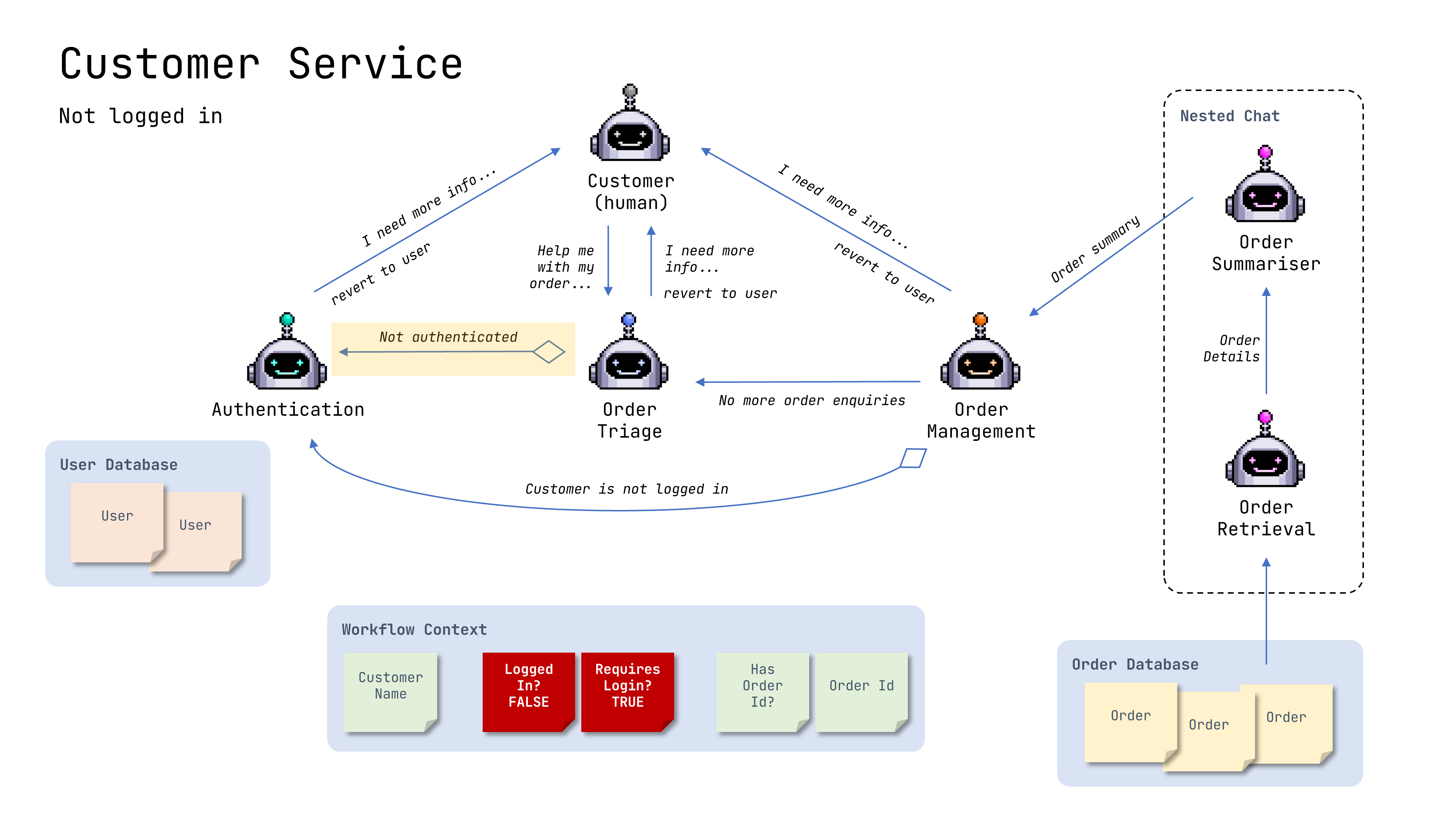
When logged in but no order id
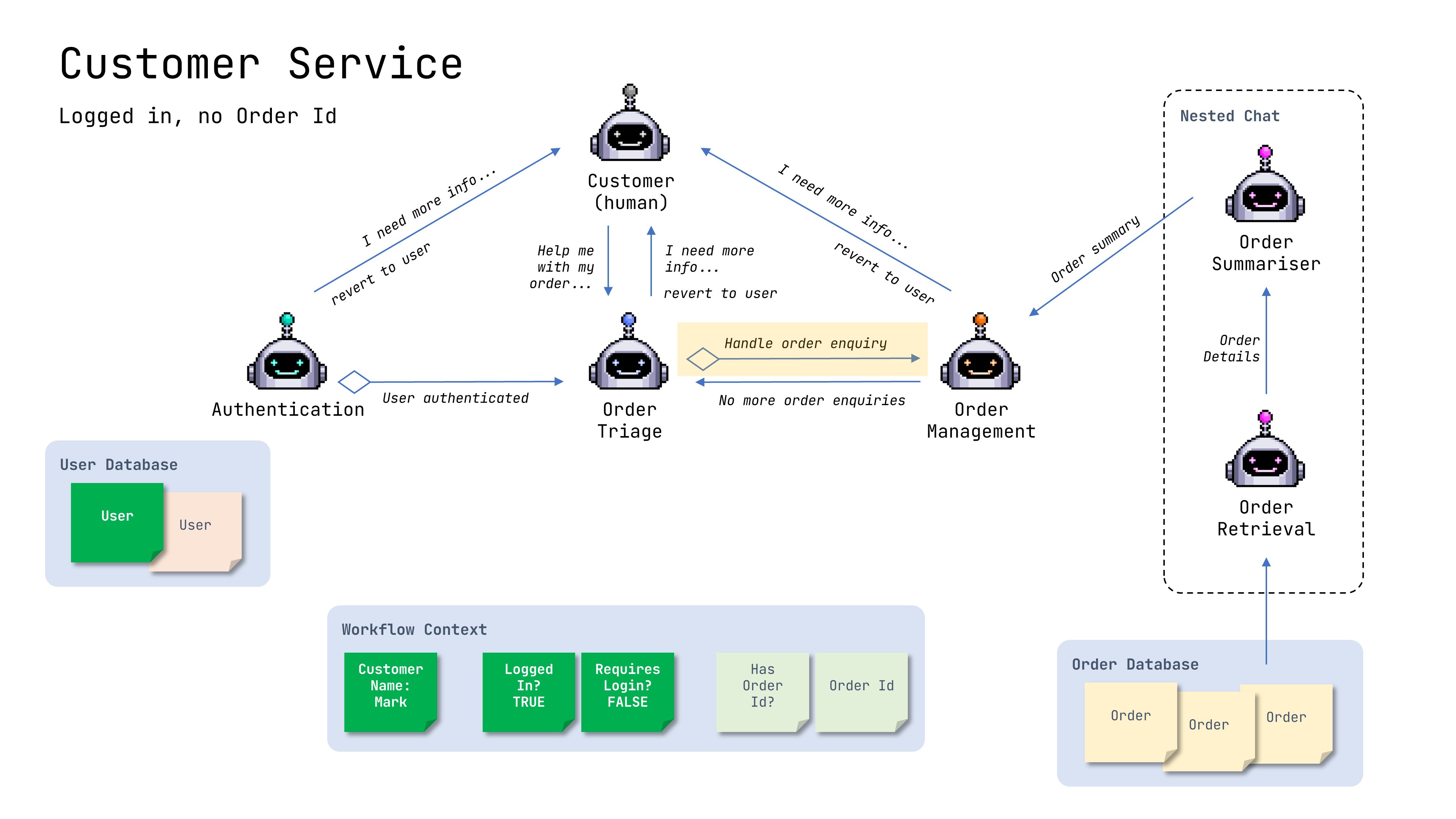
When logged in with order id
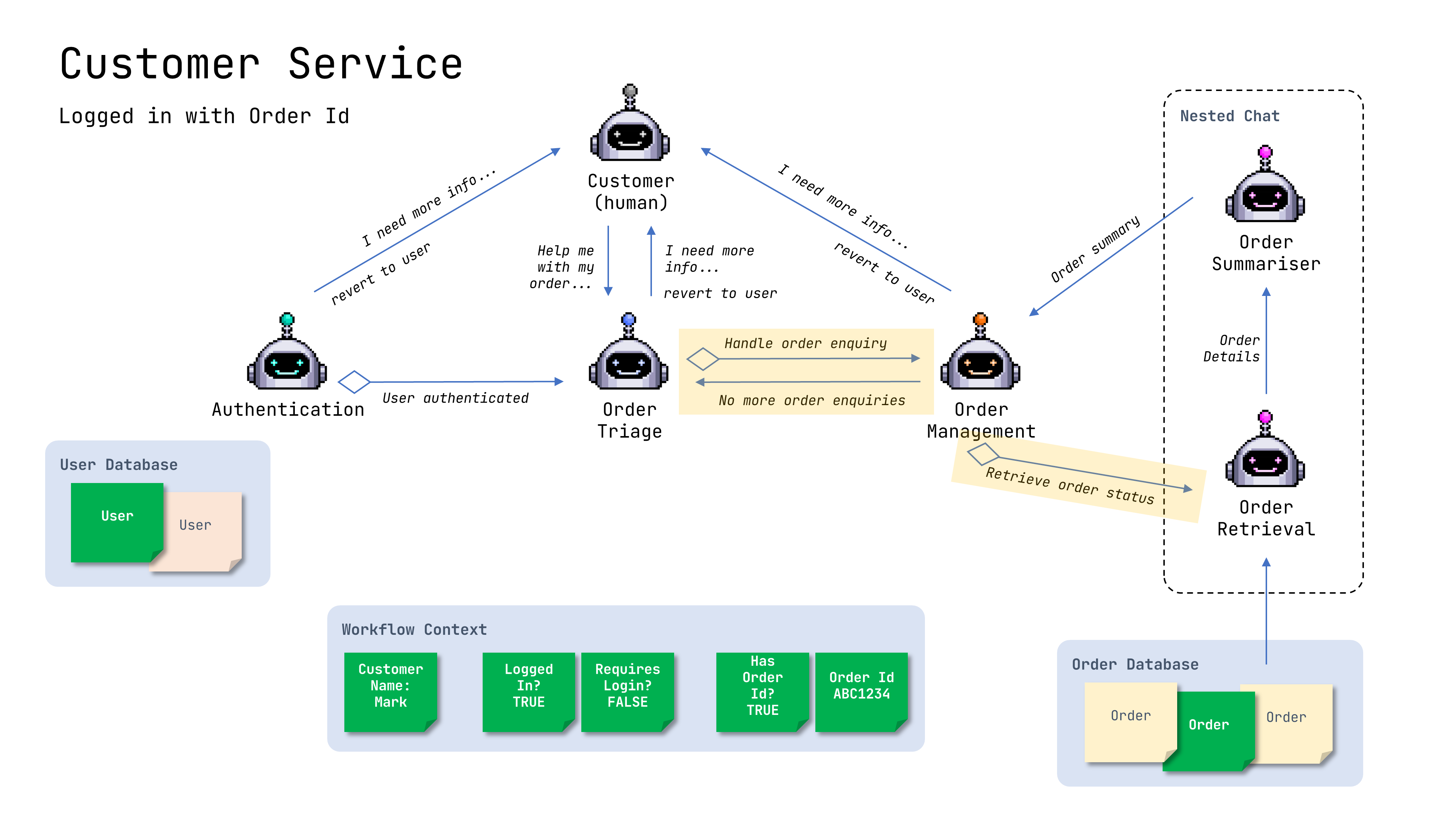
Agent state
Agent System Messages with context
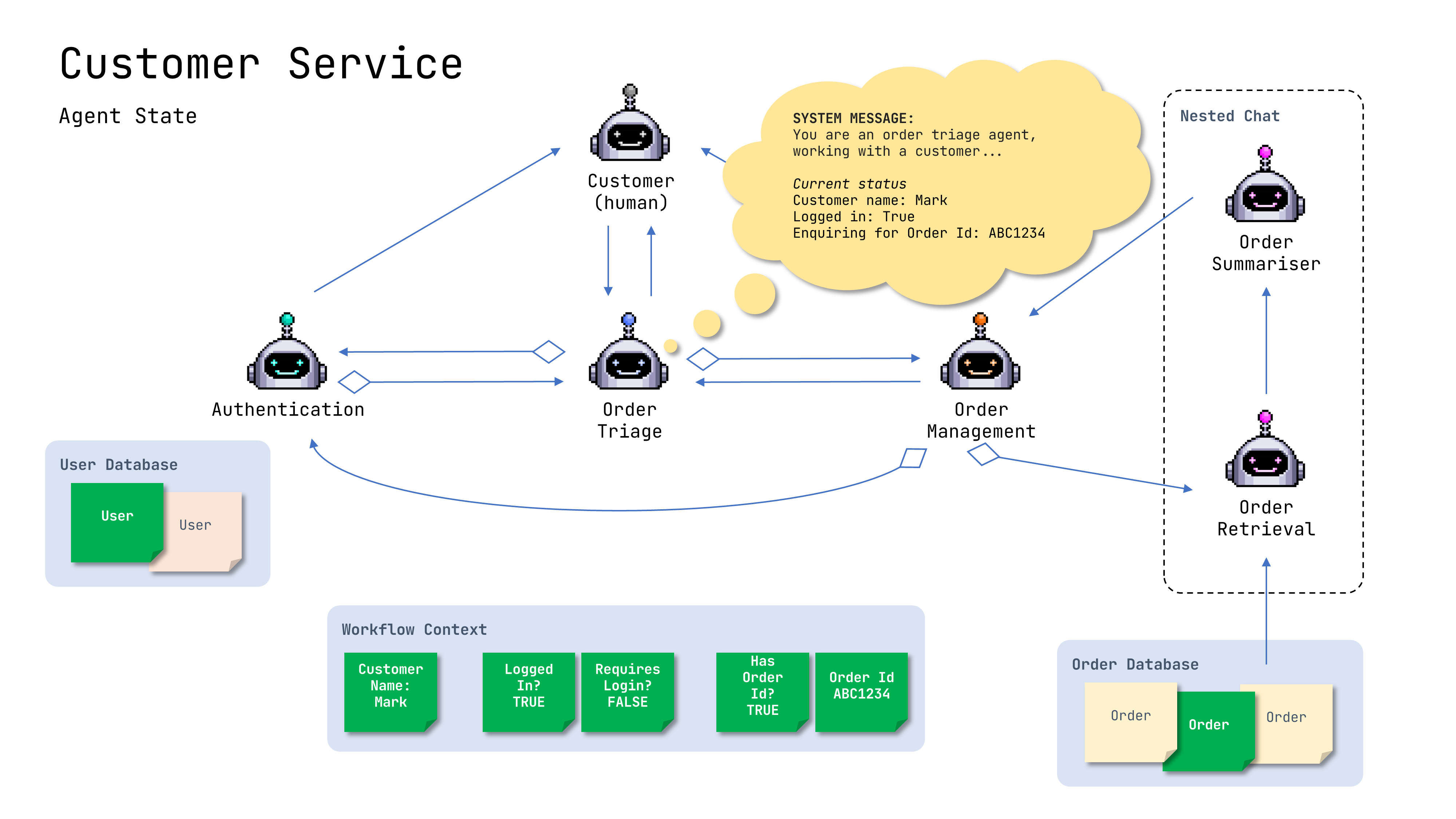
Assistant
Responses are generated using AI and may contain mistakes.

